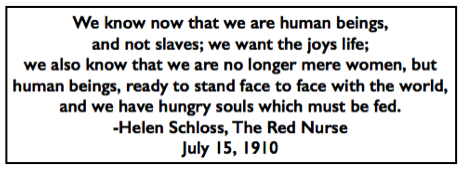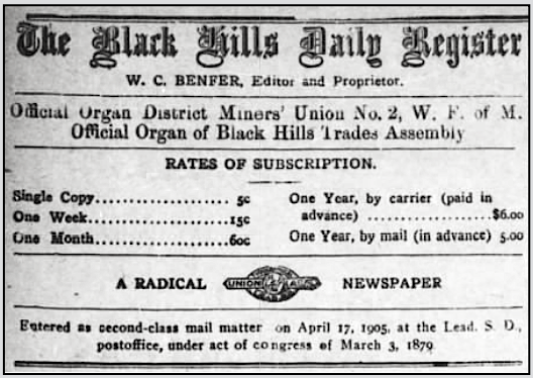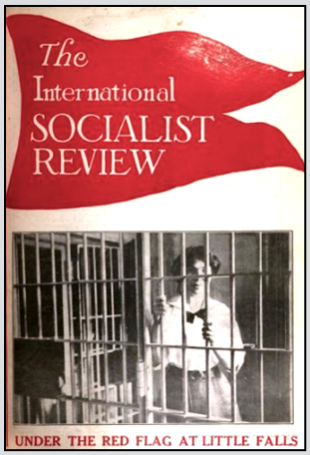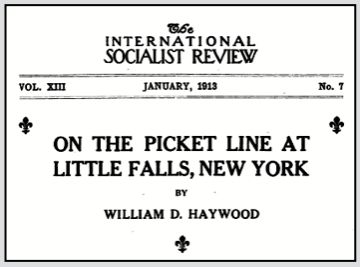 ———-
———-
Hellraisers Journal – Wednesday July 20, 1910
“The Beginning of Life” by M. Helen Schloss
From The Black Hills Daily Register of July 15, 1910
-Official Organ of Western Federation of Miners, District 2:
I sat looking out in the cold, dark, dreary night listening to the roaring winds and the gruesome sounds of the elements. Everything seemed to whisper mournful tales and all different sounds were telling me of the life that is to come when the soul awakens.
Lost in these thoughts, I suddenly came upon a large tract of land. On this tract of land stood two huge scales with iron chains. At one scale stood men, and at the other women and children. The men were pulling leisurely; they would look up now and then and pause to rest, while the women and children never stopped to look up or rest. Their bodies were bent to the ground, and their faces were old and haggard. The children would drop like flies from exhaustion, but there were others to take their places, while the women would never take the time to look after them.
I walked up to a woman and asked why they were living in such darkness, and why they were pulling so hard, and she gave me a vacant stare. I walked up to a man and asked him the same question, and he said: “They were pulling for life.” I asked why the women were pulling so hard, while they were pulling so easy. He answered: “When we were called out of our houses to pull the women became frightened of these men on the top and they have never dared to look up. If they would stop and look up they would not have to pull so hard, but they fear.”
Sometimes the men would shake their fists at the men on top, and then the chains would grow lighter and the scale would lower a few inches. But the scale of the women would never lower. Some fell to the ground with blood on their hands and faces. The groans from the people below and the sneering laughter from those above filled the air with unearthly sounds.
The perpetual pulling of these heavy chains became unbearable and something began to pull at my heart strings. I wanted to get a knife and tear these chains asunder. I cried out in the darkness and the faint cry was lost in the air. I groped with my sisters, and could could not find my way. While I was with them I had to suffer. I tried to pull at the chains, and my hands became blistered. I raised my voice again, but no one could hear. I was a stranger among these dead souls. I could see the darkness, but could not find light.
Wrapped in utter despair I cried out to the passing winds, and that cry seemed to reach some hungry soul who was begging for light. Suddenly a faint glimmer of light spread on the distant horizon and as it grew brighter and brighter I saw the woman look up for the first time. As the light began to spread I saw these bodies rise up as if they were awakening from some long, long slumber.
The sun cast its glorious radiance over the people, the dewdrops glistened in their splendor, and the birds began to sing. All life was rejoicing in the new-born day. Tile bodies of the women became erect, and all stopped pulling the chains as if with one accord. I heard the curses of the men from the top and I saw hurl missiles, but the women never heeded them. The men marched with them and they all walked toward the east, where the sun rises, and their steps became springy, and the soul in their eyes shone like stars and at dusk when the sun set in the west I saw letters in the tinted hues of the setting sun forming the words:
We know now that we are human beings, and not slaves; we want the joys life; we also know that we are no longer mere women, but human beings, ready to stand face to face with the world, and we have hungry souls which must be fed.
And the letters faded like the sun into night once more; not the night of dark souls, but the mystic night which artists love to paint.
[Emphasis added.]
~~~~~~~~~~~~~~~~~~~~~~
SOURCE & IMAGES
The Black Hills Daily Register
(Lead, South Dakota)
-July 15, 1910
https://www.newspapers.com/image/91659036/
See also:
-for photo of Helen Schloss behind bars, see:
Cover of ISR for January 1913
https://play.google.com/books/reader?id=qFNIAAAAYAAJ&printsec=frontcover&pg=GBS.PA516-IA3
William D. Haywood re Little Falls NY Strike
https://play.google.com/books/reader?id=qFNIAAAAYAAJ&printsec=frontcover&pg=GBS.PA519
Search: “helen schloss” 1912-1915
https://chroniclingamerica.loc.gov/search/pages/results/?state=&date1=1912&date2=1915&proxtext=%22helen+schloss%22&x=11&y=15&dateFilterType=yearRange&rows=50&searchType=basic&sort=date
From Upstate Earth Blog by Michael Cooney
“Tales from the Rock City” by Helen Schloss, 1913
https://upstateearth.blogspot.com/2016/11/tales-from-rock-city-by-helen-schloss.html
The Red Nurse: Helen Schloss at the Ludlow Massacre
https://upstateearth.blogspot.com/2015/08/the-red-nurse-helen-schloss-at-ludlow.html
The Red Nurse
-by Michael Cooney
Createspace Independent Pub, 2012
https://books.google.com/books?id=UNyXoAEACAAJ
This novel tells the story of the Little Falls textile strike of 1912 from the perspective of one of its leading participants, M. Helen Schloss. She was a public health nurse and an active socialist before she came to Little Falls, New York at the invitation of a group of wealthy women. When workers at the Phoenix and Gilbert textile mills struck against wage cuts in October, she was ready to support them in every way she could. Over the next three months, Little Falls was the national focus for the growing labor movement as Socialist Party and IWW activists from around the country joined the battle. But it was not the radical celebrities of the era who won the strike. It was the largely female, immigrant workers and the two women who led them: Helen Schloss and Matilda Rabinowitz. Also included is an excerpt from Matilda’s unpublished memoir, courtesy of her granddaughter Robbin Legere Henderson. Matilda went on from Little Falls to lead strikes across the country and was an active writer until very late in life. Helen, who organized medical care at the great Paterson and Ludlow strikes, vanishes from history after she went to Russia in 1921.
~~~~~~~~~~~~~~~~~~~~~~~~~~~~~~~~~~~~~~~~~~~~~
Bread and Rose – Cast of Pride




